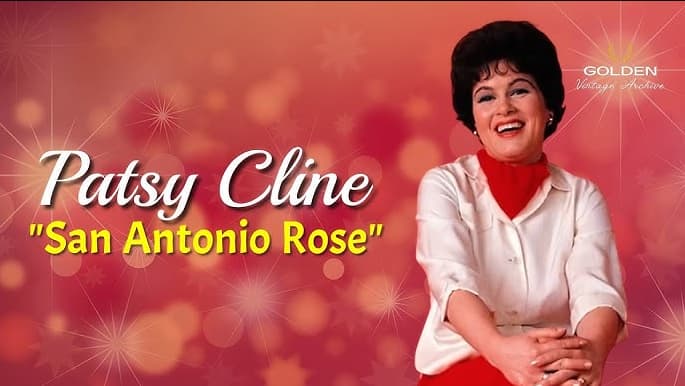
A Timeless Echo of Lost Love and Fading Dreams
There are songs that simply exist, and then there are songs that live. They breathe, they ache, and they carry the weight of countless memories on their melodies. For many of us, especially those who came of age when country music spoke directly to the soul with an unvarnished honesty, Patsy Cline‘s rendition of “San Antonio Rose” is undeniably one of the latter. Released in 1962, a year that now feels like a lifetime ago, this particular track didn’t blaze up the charts in the same way some of her other iconic hits did. It wasn’t a number one smash like “Crazy” or “I Fall to Pieces,” which dominated the country landscape and even crossed over into pop. Instead, it was a B-side to “The Wayward Wind,” and as such, its chart performance was more subdued. While “The Wayward Wind” reached a respectable #12 on the Billboard Hot Country Singles chart, “San Antonio Rose” itself didn’t chart independently. Yet, its understated presence belied a profound emotional depth that has resonated with generations, weaving itself into the very fabric of our collective musical heritage.
The story behind “San Antonio Rose” is as rich and layered as the Texas soil from which it sprang. The song itself was not an original for Patsy Cline. It was penned by the legendary Bob Wills in 1939, a cornerstone of Western Swing music, and quickly became one of his most beloved and enduring compositions. Wills originally recorded it as an instrumental, but later, lyrics were added, and it blossomed into the wistful ballad we know today. For Patsy Cline to tackle such an iconic piece of American music was both a testament to her vocal prowess and a nod to her deep respect for the genre’s roots. Her version, recorded during a period when she was at the absolute zenith of her artistry, brought a new dimension to the song. She didn’t merely cover it; she inhabited it, infusing every note with her signature blend of raw emotion and sophisticated control.
At its heart, “San Antonio Rose” is a poignant elegy to a love that has withered, a dream that has faded, much like the petals of a wilting rose. The lyrics, simple yet profound, speak of longing for a time when love bloomed brightly in the “rose of San Antone,” a metaphorical representation of a cherished person or a bygone era. It’s about looking back with a bittersweet ache, remembering the beauty and joy that once was, even as the present feels tinged with a quiet sorrow. For those of us who have lived long enough to accumulate our own share of regrets and “what ifs,” the song speaks volumes. It’s the silent sigh after a memory surfaces, unbidden, of a simpler time or a love that, for whatever reason, didn’t last. The “rose” isn’t just a flower; it’s a symbol of fleeting beauty, of love’s delicate nature, and the inevitable passage of time that sweeps away even the most vibrant hues.
What made Patsy Cline‘s interpretation so utterly captivating was her unparalleled ability to convey profound emotion without ever resorting to theatrics. Her voice, a rich contralto that could glide effortlessly from a tender whisper to a powerful cry, was a vessel for pure feeling. When she sang “San Antonio Rose,” you didn’t just hear the words; you felt the weight of every lost moment, every unspoken regret. The subtle vibrato, the perfect phrasing, the way she lingered on certain notes – it all combined to create an atmosphere of profound melancholic beauty. It’s a song that invites introspection, a quiet moment of reflection on loves that have come and gone, on the changes life inevitably brings, and on the enduring power of memory. For an older listener, it’s a journey back in time, a gentle reminder of youthful days and the innocence that perhaps, in hindsight, seems even more precious now. It’s not about grand gestures or dramatic pronouncements; it’s about the quiet, persistent ache of a heart that remembers and still cares deeply. And in that quiet resonance, Patsy Cline‘s “San Antonio Rose” continues to bloom eternally.